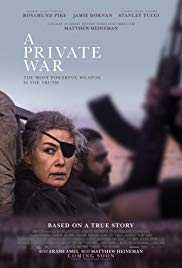
A PRIVATE WAR
UK/US, 2018, 118 minutes, Colour.
Rosamund Pike, Jamie Dornan, Stanley Tucci, Tom Hollander, Greg Wise, Nikki Amuka- Bird.
Directed by Michael Heineman.
The central character of A Private War is the American journalist, Marie Colvin, who went into many war zones to report on the actualities of war but also the repercussions of the war on local people, the human stories, especially concerning children, injuries and deaths.
She is played by Rosamund Pike in what is quite a tough performance. Marie Colvin was American but worked internationally, especially for newspapers in the UK, The Sunday Times, with Tom Hollander playing the demanding, even exploitative, editor of the paper). Marie Colvin was an award winner and this is seen in the narrative that the film.
However, and significantly, she went to war zones in Sri Lanka, interviewing Tamils, but being injured in a raid and losing her eye. She tended then to wear a black patch – and this is a challenge to Rosamund Pike for her performance, especially with having to perform with only one eye, in looking at people, in indicating moods, interactions…
After some time and recuperation, she is eager to go back to the war zones, getting help from a friend to go to Afghanistan, experiencing roadside explosions, bonding with a former military now journalistic photographer, Paul Conroy, played by Jamie Dornan. They work together for some years.
In the meantime, she encounters a professional businessman at a party, Stanley Tucci, and begins an affair with him.
The film opens graphically with overviews of the destruction of the Syrian city of Homs. And the film, ends in Homs, with Marie and Paul doing interviews, getting material to be played on CNN to alert the world to the plight of Syria. But, in a bombardment, she and her interpreter are killed.
This film is a tribute to her and her work and motivations.
1. The film based on the career of Marie Colvin? As journalist, as present in war situations? Losing her life in Syria? Audience knowledge of her and her career?
2. The title, with reference to Marie and her activities, her involvement, her going on missions, her independence, seemingly fearless, strength of will?
3. The action taking place from 2001-2010? The framework and visuals of the devastation of the Syrian city of Homs? The place where Marie was killed? The state of war in the world, Sri Lanka, the countries of the Middle East, 9/11, in Iraq, in Afghanistan, Syria?
4. Audience response to the role of journalists, getting information, finding stories, raising issues, humanising them? The news, print, radio, television and their particular effects on the public?
5. Marie Colvin, Rosamund Pike’s performance? The background of her life, American, marriage, the initial scenes with the professor, her inability to sustain a marriage and yet her desire for a child? Her hopes, wanting to become pregnant? Demanding? The strength of her inner life, compulsions? The range of her career, the dangers?
6. The Sunday Times? The role of the editor, his personality, his ambitions, achievements? His skills, his demands on his journalists, the winning of awards, Marie and the award ceremony? Keeping in touch, his finger on the pulse, internationally?
7. Sri Lanka, the Tamil Tigers? Marie’s presence, the talks, the issues, the guides, making connections? The attack? Her being hit, the injury, losing her eye? The return, hospital, finding it difficult to cope, wanting to continue her work? Interactions with the editor? Her wearing the eyepatch – and the challenge for Rosamund Pike to act and communicate with the use of only one eye?
8. The scenes of recuperation, her desire to leave, the situation in Afghanistan, her friendship with Norm, his help? The meeting with Paul, demanding of him, his travelling with her, the roadside bombs, her encounter with children, deaths? Her reports, the deaths Wanting her?
9. Her return home, the party, socialites, the encounter with Tony, the beginning of the relationship, her rapport with him? The time needed for rest and recuperation?
10. The further trips, Paul accompanying her, his character, support? Friendship? His background, the Army, court-martialed, photographer?
11. Afghanistan and Syria, in the hotels, the dangers, basis for excursions, her writing, the interviews, the connections with the London office, break in communications?
12. The importance of the television interviews, the contacts, the impact on the public?
13. Going to Homs, the dangers, her insistence on the interviews?
14. The attack, the death? Tributes to her? Paul and his continued work?
15. The story bringing the reality of war journalists, their hard work, intentions, motivations, concerns, to the media public?